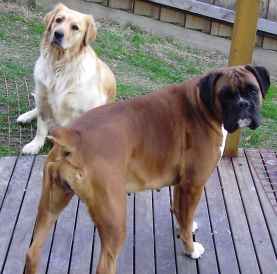|
Oncology
Having your pet diagnosed with cancer is very difficult news to receive. If your pet has been diagnosed with canc er it is important to stay calm and gather as much information as possible about the illness. If your pet was diagnosed at the Animal Hospital of Chetek or the Animal Hospital North, this information will have been provided to you. er it is important to stay calm and gather as much information as possible about the illness. If your pet was diagnosed at the Animal Hospital of Chetek or the Animal Hospital North, this information will have been provided to you.
It is important to remember that cancer is not necessarily a reason to euthanize a pet. Many cancers are treatable, and nearly ever cancer can be managed in order to provide your pet with a good quality of life.
At the Animal Hospital of Chetek and Animal Hospital North in Rice Lake, we are committed to making clients part of the treatment team offering them the a broad range of effective treatments for their pets, along with a frank, compassionate discussion about therapeutic options and the cost of those options. At the Animal Hospital of Chetek and Animal Hospital North, our clients find the optimal combination of technology and compassion that they would expect for themselves and other family members if they were diagnosed with a life-threatening illness.
There are 2 equally important goals to keep in mind when treating cancer in our pets:
1. We want to control the tumor for as long as possible, ideally we want to cure the patient.
2. We want to maintain a good to excellent quality of life for the patient throughout the duration of treatment. This is our most important goal of therapy at all times.
There are 3 basic treatment options for pets with cancer. These treatments may be used alone, or in combination, depending on the type of cancer diagnosed.
Our doctors will help you choose which option is best for your pet. And if needed, we are more than willing to work with a board certified veterinary oncologist/surgeon for more advanced cases. However, most cancers, especially lymphoma can be treated readily at the Animal Hospital of Chetek and the Animal Hospital North. This will save you multiple trips to the Twin Cities or Madison where most veterinary oncologists are located.
1. Surgery:
Surgery is used as the single method of treatment if the tumor is benign, or if the tumor is known to be very slow to metastasize. Surgery is combined with chemotherapy when the tumor is known to metastasize very quickly. Surgery is combined with radiation therapy if complete removal of the tumor is not possible with surgery alone.
2. Chemotherapy: 
Chemotherapy is very commonly used in dogs and cats with cancer. Chemotherapy drugs are used when the tumor has spread beyond the original site of growth, or when the tumor affects more than one area of the body. It may also be used for a tumor that we know historically has a very high chance of metastasizing. The chemotherapy drugs that are used for dogs and cats are the same chemotherapy drugs used for people. Because maintaining a normal quality of life is one of our main goals, we use chemotherapy somewhat less aggressively than in human medicine. Also, dogs and cats seem to be more tolerant of chemotherapy than people, and they do not suffer from as severe side effects. Significant nausea, diarrhea, depression and lethargy are unacceptable side effects when treating our pets and generally occur in less than 10% of patients. Pets do not commonly lose their hair like people do that are receiving chemotherapy. Severe hair loss is not common, but may occur in breeds such as poodles and terriers (usually dogs that require regular grooming).
3. Radiation therapy:
While we are able to offer surgical and chemotherapy treatments, at this time we do not have a radiation unit. When radiation therapy is needed we will refer your pet to a specialty hospital like the University of Minnesota. Often times the University will complete the radiation therapy and we will finish the chemotherapy while staying in close communication with the university oncologists.
Radiation therapy is most often used to treat tumors that cannot be completely removed with surgery. During therapy, radiation patients must lie perfectly still. In veterinary patients, this means that they must be anesthetized. The radiation treatments are not painful. Typically, it involves multiple treatments over a course of 3 to 5 weeks. Dogs and cats do not experience the fatigue experienced by human radiation patients. Side effects generally start during the second half of therapy and can get worse for 1 or 2 weeks after therapy is completed. These side effects only occur in the part of the body receiving therapy. Cats generally experience mild acute side effects compared to dogs. Side effects will heal by about 1 month after finishing radiation therapy and depend on the area being treated.
If your pet has been diagnosed with cancer and you would like to pursue chemotherapy, or you would simply like a second opinion, please do not hesitate to call us. The more information you have, the better you will be able to care for your pet.
Animal Hospital of Chetek: 715-859-6650
Animal Hospital North (Rice Lake): 715-736-6650
|
